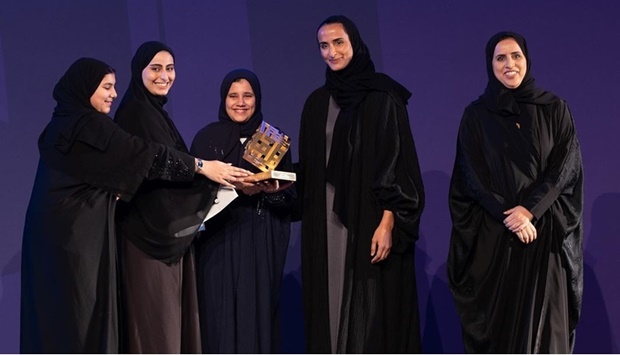An Arabic language app that aims to counteract the negative impact of social media on Muslim girls and strengthen their Islamic values has been named the winner of the fifth cycle of Qatar Foundation’s (QF) Akhlaquna Award.
At the annual Akhlaquna Day ceremony in Education City Tuesday, attended by HE Sheikha Hind bint Hamad al-Thani, Vice-Chairperson and CEO of QF, the Strong Muslim Girls App – created by a team of students from Moza Bint Muhammad Primary School for Girls – emerged victorious from the three shortlisted projects.
The award recognises young people whose projects and actions embody ethical behaviours and good moral character. The event also saw the announcement of the latest batch of winners of the Akhlaquna Junior award, celebrating young people from schools across Qatar who exemplify strong values and empower others to adopt them.
Established in 2017, Akhlaquna reinforces the idea that knowledge and morality are intertwined, highlighting the timeless, universal, and inclusive values exhibited by the Prophet Muhammad (peace be upon him) – mercy, tolerance, honesty, and generosity – and seeking to encourage and drive positive behavioural change in society.
Catering for girls aged 10 and above, and available on the Google Play store, Strong Muslim Girls App has been designed with the goal of enhancing Islamic identity, cultivating values such as honesty and good manners, and allowing Muslim girls to share pictures and images in a safe environment.
Offering an alternative to traditional social networking sites, it also allows users to reflect on themselves and their talents and interests, and organise their daily schedules to practice acts of worship – and, as an Akhlaquna Award winner, its team will now be supported by QF to explore how Strong Muslim Girls App can be taken to the next level.
Alaa al-Tas, project supervisor of the Strong Muslim Girls App, said: “Our project aims to spread sufficient awareness about the dangers of social media, and to educate young Muslim girls about the psychological, behavioural and social impact of media content they are exposed to, while providing them with an alternative and safe platform on their electronic devices, where they can adopt good moral values and which helps them adhere to our Islamic culture and moral values, and encourage them to invest their time in what is beneficial to them.”
Also shortlisted for the Akhlaquna Award were the educational platform Nutripedia, which provides nutritionbased scientific content in the Arabic language; and the QLA Plant Clinic & Research Center, developed by students at Qatar Leadership Academy — a school under QF’s Pre-University Education — which aims to develop awareness and ethical values around environmental sustainability, and change the way people think about consumption and disposal.
The winners of the Akhlaquna Junior award were Saeed Fahad Saeed, from Ali bin Abdulla Model School for Boys; Shoaa Mohamed Alsuliti and Almaha Hassan Alsubaey, both from Qatar Academy Doha; Hind Hassan Aljaber, from Qatar Academy Al Wakra; Mubarak Saleh Alkuwari, from the English Modern School in Al Khor; Mohamed Abdulla Alfakhroo, from Al Jazeera Academy; Shaikha Khalid Alnasr, from Tariq Bin Ziad School; and Hamad Saad Almohannadi, from Qatar Academy Al Khor.
With Akhlaquna Junior ambassador and former award winner Fatima Saad al-Mohannadi as Master of Ceremonies, Akhlaquna Day — which saw those attending in-person browse an exhibition featuring the top 10 projects in the fifth cycle of the Akhlaquna Award, and previous Akhlaquna Junior winners — also welcomed Khalid al-Shaibei, a Grade 7 student at QF’s Qatar Academy Doha and a community volunteer, as one of its keynote speakers.
Speaking about his keen interest in caring for the environment, he told the audience: “My interest in the environment started with raising awareness about the risks of plastics – the impact it has on the environment. So, we proposed that we establish a team called ‘Activists in Action’ with the motto that single-use plastics should be banned so that greener options can be made available.”
Al-Shaibei, who is also an active volunteer, encouraged everyone to engage in volunteering activities. “This is a way to serve to our communities, we shouldn’t hesitate to help our community. And this is particularly important because we are going to be hosting the FIFA World Cup Qatar 2022.”
Al-Shaibei was joined as keynote speaker by Qatari mountaineer Fahad Badar, who, on a mountaineering expedition, lost four of his fingers due to frost bite. An unfortunate turn of events led to this, but Badar said: “I do not think my accident is going to stand between me and what I love. I will definitely go back to climbing mountains. The lesson from my accident is not the failure itself, but the reaction to the failure. In my resilience, I have found that many people see me as a role model; just like you. You are all role models.”
The Akhlaquna projects were evaluated by an expert panel of judges, comprising Dr Jassim Sultan, director of Wijdan Cultural Center; Dr Emad El-Din Shahin, dean of the College of Islamic Studies at QF’s Hamad Bin Khalifa University; and Professor Mabrouk Zeid Elkheir, director of the National Center for Research in Islamic Sciences and Civilisation, Algeria.
The three shortlisted projects for the Akhlaquna Award were also opened up to a public vote.

